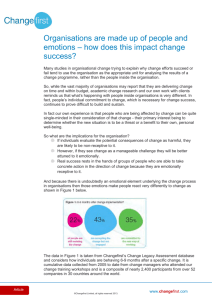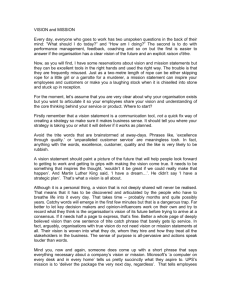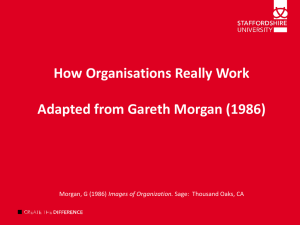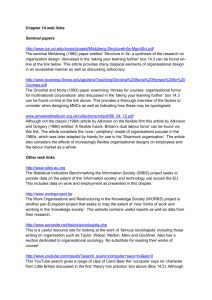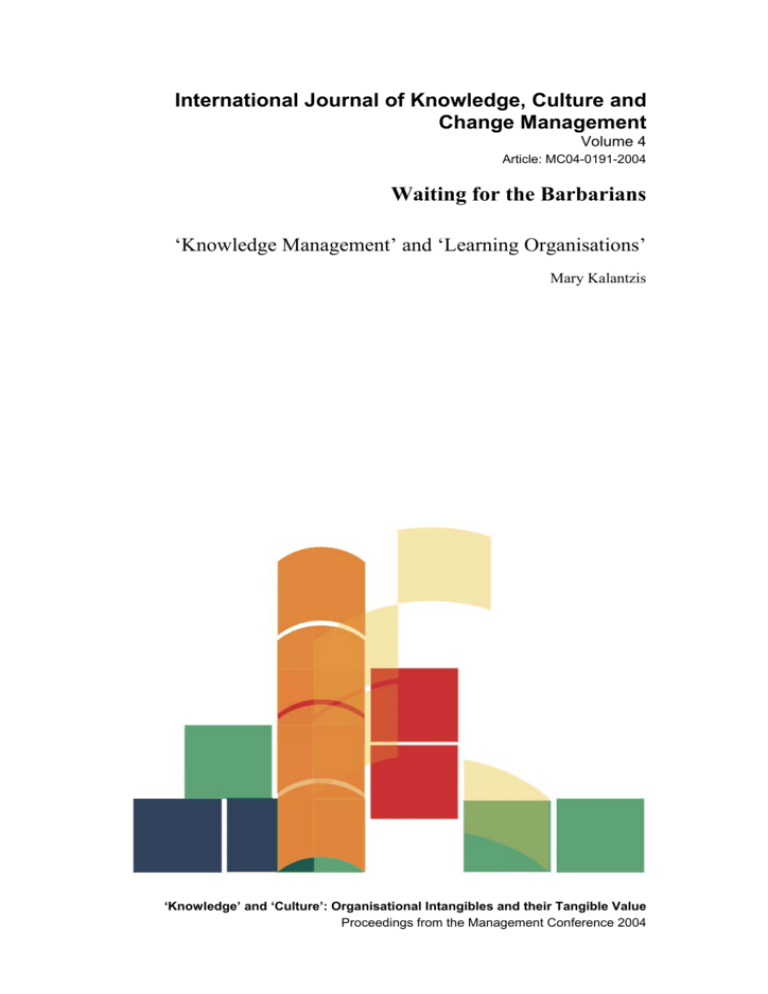
International Journal of Knowledge, Culture and
Change Management
Volume 4
Article: MC04-0191-2004
Waiting for the Barbarians
‘Knowledge Management’ and ‘Learning Organisations’
Mary Kalantzis
‘Knowledge’ and ‘Culture’: Organisational Intangibles and their Tangible Value
Proceedings from the Management Conference 2004
International Journal of Knowledge,
Culture and Change Management
Volume 4
www.ManagementConference.com
www.CommonGroundGroup.com
This journal and individual papers published at www.Management-Journal.com
a series imprint of theUniversityPress.com
First published in Australia in 2004/2005 by Common Ground Publishing Pty Ltd at
www.Management-Journal.com/
Selection and editorial matter copyright © Common Ground 2004/2005
Individual papers copyright © individual contributors 2004/2005
All rights reserved. Apart from fair dealing for the purposes of study, research, criticism or review as permitted
under the Copyright Act, no part of this book may be reproduced by any process without written permission from
the publisher.
ISSN: 1447-9524 (Print)
ISSN: 1447-9575 (Online)
Cover design by Common Ground
The International Journal of Knowledge, Culture and Change Management is a peer-refereed journal published
annually. Full papers submitted for publication are refereed by the Associate Editors through an anonymous
referee process.
Papers presented at the Fourth International Conference on Knowledge, Culture and Change in Organisations,
University of Greenwich in London, United Kingdom, 3-6 August 2004.
Editors
Mary Kalantzis, Innovation Professor, RMIT University, Melbourne, Australia.
Bill Cope, Common Ground and Visiting Fellow, Globalism Institute, RMIT
University, Australia.
.
Editorial Advisory Board
Chryssi Vitsilakis-Soroniatis, University of the Aegean, Rhodes, Greece.
Eleni Karantzola, University of the Aegean, Rhodes, Greece.
Gerasimos Kouzelis, University of Athens, Greece.
Leslie Johnson, University of Greenwich, UK.
Bruce Cronin, University of Greenwich, UK.
Martyn Laycock, University of Greenwich and managing transitions.net, UK.
Dave Snowdon, Cynefin Centre for Organisational Complexity, UK.
David Lyon, Queens University, Ontario, Canada.
Krishan Kumar, University of Virginia, USA.
Claudia Schmitz, Cenandu Learning Agency, Germany.
Bill Martin, RMIT University, Melbourne, Australia.
Paul James, RMIT University, Melbourne.
Rob Brooks, RMIT University, Melbourne, Australia.
Margaret Jackson, RMIT University, Melbourne, Australia.
David Hakken, University of Indiana, Bloomington, Indiana, USA.
Zainal Ariffin, Universiti Sains Malaysia, Penang, Malaysia.
David Gurteen, Gurteen Knoweldge, UK.
Verna Allee, Verna Allee Associates, California, USA.
Rod Dilnutt, William Bethway and Associates, Melbourne, Australia.
Judith Ellis, Enterprise Knowledge, Melbourne, Australia.
Kirpal Singh, Singapore Management University, Singapore.
Waiting for the Barbarians
‘Knowledge Management’ and ‘Learning Organisations’
Mary Kalantzis
The great Greek poet CP Cavafy, lived from 1863 to
1933, a tumultuous period in modern history, to be
sure. ‘Waiting for the Barbarians’ is one of his finest
poems.
Waiting for the Barbarians
And some who have just returned from the
border say there are no barbarians any longer.
And now, what is going to happen to us without
barbarians?
They were, those people, a kind of solution.
CP Cavafy, 1863-1933 (Bien et al., 2004) pp.2-3.
- What are we waiting for, assembled in the forum?
The barbarians are due here today?
- Why isn’t anything happening in the senate?
Why do the senators sit there without legislating?
Because the barbarians are coming today.
What laws can the senators make now?
Once the barbarians are here, they’ll do the
legislating.
- Why did our emperor get up so early,
and why is he sitting at the city’s main gate
on his throne, in state, wearing the crown?
Because the barbarians are coming today
and the emperor is waiting to receive their leader.
He has even prepared a scroll to give him,
replete with titles, with imposing names.
- Why have out two consuls and praetors come out today
wearing their embroided, their scarlet togas?
Why have they put on bracelets with so many amethysts,
and rings sparkling with magnificent emeralds?
Why are they carrying elegant canes
beautifully worked in silver and gold?
Because the barbarians are coming today
and things like that dazzle the barbarians.
- Why don’t our distinguished orators come forward as
usual to make their speeches, say what they have to say?
Because the barbarians are coming today and
they’re bored by rhetoric and public speaking.
- Why this sudden restlessness, this confusion?
(How serious people’s faces have become.)
Why are the streets and squares emptying so rapidly,
everyone going home so lost in thought?
Because night has fallen and the barbarians
have not come.
I have a feeling, and particularly when it comes to
the question of knowledge management, or for that
matter its cousins knowledge economy and
knowledge society, that we are living through
another moment of anxiety whose prevailing
sensibility is similar to that expressed with such
eloquence and subtlety by Cavafy.
Knowledge management is our new barbarism. Its
rise coincides with the pervasive spread of the new
tools of the so-called information society—first
computers and communication systems; then more
recently networked information systems and the
cacophony of derivatives some of which go by the
names of asynchronous messaging, groupware and
content management systems. The barbarism here is
in the reduction of the human to the mechanical, so
naively at times as to think that the battle for the
hearts and minds of the citizens will be won with
weapons alone. This is surely not the case, no matter
how smart their conception and precise their
targeting.
More barbaric still is the process of reducing the
tacit and implicit to the clearly documented and
explicit, as if the specificities of time and place and
person can be stripped from experience without
doing damage to the knowledge such an endeavour
is designed to distil.
Yet like Cavafy’s Romans, we often find ourselves
entering the dialogue around data and information
and knowledge as if we wanted our worst fears to
come true. Of course people won’t be replaced by
machines and the formalised systems of data they
require. In fact, I want to argue that in these
barbarians there is also a kind of solution. What a
relief, these barbarians.
***
In the midst of change it is possible to be panicked
by the scale, urgency and immediacy of the
transition, or complacent about trends which seem to
be longer term or even simply the re-emergence of
perennial dilemmas. Neither is helpful, which is why
I find the loose temporal aggregation ‘epochal
shifts’ to be more helpful. Viewed on a timescale of
decades, we are at a turning point the shape of which
International Journal of Knowledge, Culture and Change Management, Volume 4 • www.Management-Journal.com
Copyright © Common Ground • ISSN 1447-9524 (Print) • ISSN 1447-9575 (Online)
Paper presented at the Fourth International Conference on Knowledge, Culture and Change in Organisations,
University of Greenwich in London, United Kingdom, 3-6 August 2004 • www.ManagementConference.com
International Journal of Knowledge, Culture and Change Management, Volume 4
is not yet fully clear, we are in the midst of one such
epochal shift. I will try to give some shape to this
shift, and highlight some emerging issues which are
symptomatic of those changes.
In our 1997 book Productive Diversity, Bill Cope
and I brought together ten years of research into the
changing nature of work (Cope and Kalantzis,
1997). We had researched the then much-touted
Japanese model, having interviewed the people
working in the training divisions of major Japanese
corporations. We had conducted numerous research
and workplace training projects in major Australian
companies as well as public sector and communitybased organisations (Cope and Kalantzis, 1995). We
decided that the perspective of the book could be no
less than the preceding century of modern work, for
it was only on this time scale that the profundity of
change could be seen, as well as the pace of change
which as glacial in some moments as it was
precipitous in others. Some of our colleagues
working on the same research agenda were bold
enough to call this change the emergence of a ‘new
work order’, and to a substantial degree our research
corroborated their view (Gee et al., 1996).
To summarise the ‘Productive Diversity’ thesis in
just a few sentences, we traced the change from
‘Fordism’ or ‘Taylorism’ with its fine division of
labour, strict hierarchy, mass production/mass
consumption dynamics and its mechanical
metaphors for structure, to ‘Postfordism’ with its
emphasis on multiskilling, teamwork, ‘flattened
hierarchy’, worker empowerment, with cultural
metaphors applied to organisational structure
supported by the ‘shared values’, corporate ‘vision’
and organisational ‘mission’. These contrasts we
developed more as an heuristic than a neat
chronology, for everywhere we went in our research
endeavours we found a kind of uneven development,
in which Fordist and Postfordist moments could be
identified in almost every workplace.
The purpose of our book however, was to discuss
another, emergent epochal shift in which
globalisation and civic pluralism challenged the
relatively simple nostrums of Postfordism about
shared values and the singularity of corporate
cultures (Kalantzis, 2001). In the most successful
organisations we noticed a fundamental shift in the
cultural metaphor from one which was, consciously
or unconsciously founded on a communitarian
notion of commonality, to one where negotiating
diversity was the key dynamic: customising products
and services for niche markets, the dynamics of
diversity in teams drawn from a globalised labour
force, building networks and alliances with other
organisations whose occupational cultures were very
different and building what were in effect crosscultural collaborations and alliances. Given the
profundity of the underlying dynamics of civic
pluralism and globalisation, this we felt added up to
a ‘Productive Diversity’, or another epochal shift in
1828
the human dynamics of work. Our notion of
‘Productive Diversity’ was an unholy mix of realism
about our economic trajectory, distressing to some,
and an act of strategic agenda-setting, providing
others with cause for optimism.
Perhaps the most profound aspect of this shift, first
in the direction of Postfordism and then Productive
Diversity, was the rise in the relative value and
significance of intangibles. Central to these
intangibles are the related notions of ‘organisational
culture’ and ‘knowledge’. Having already discussed
the notion of organisational culture, I will focus for a
moment on the notion of organisational and
professional knowledge—an interest of mine which
as developed since the publication of Productive
Diversity.
‘Knowledge economy’, ‘knowledge management’
and ‘knowledge worker’ are three buzz-words that
are frequently used to describe what is new about
contemporary work and productive life (Stewart,
1998). Perhaps these terms are used too easily, too
glibly even. However, the term ‘knowledge’ does
point to three key aspects of today’s organisations,
and today’s economy:
Technological: The knowledge economy is heavily
dependant on technologies which assist the flow of
information—within enterprises, between enterprises and
between enterprises and consumers (Castells, 2000;
Castells, 2001). Herein lies the primary basis for
productivity improvement and competitive advantage.
Moreover, these are technologies more infused with
human meaning than ever before, their human interfaces
drenched with textuality, visual symbology and
representational and cultural force (Cope and Kalantzis,
2003).
New Slide
Commercial: In the knowledge economy, the capital
value of an enterprise’s asset base and the market value
of its tradeable products is increasingly located in
intangibles—brand, reputation, business systems,
customer base, intellectual property, human skills and
the capacity of the organisation to capture, systematise,
preserve and apply knowledge.
Cultural: Human needs have been transformed to
the point where, in the marketplace, consumers
focus on representations as much as they do on
physical entities—design, aesthetics, concepts,
brand associations and service sensibilities (Cope
and Kalantzis, 2002).
In some important respects, this simply develops
and extends lines of thought that are decades old, be
they from the fields of management or social theory.
Of all management theorists, Drucker has one of the
longest views, in part for the simple reason that he
has remained a cogent commentator into a ripe old
age (Drucker, 1998; Drucker, 2001). In his 1993
book, Post-capitalist Society, he reflects on the
change in the following terms:
Waiting for the Barbarians
When I first began to study management, during and
immediately after World War II, a manager was defined
as ‘someone who is responsible for the work of
subordinates’. A manager, in other words, was a ‘boss’,
and management was rank and power. ... But by the
early 1950s, the definition had already changed to ‘a
manager is responsible for the performance of people’.
Now we know that this also is too narrow a definition.
The right definition is ‘a manager is responsible for the
application and performance of knowledge’ (Drucker,
1993).
As for the knowledge that is now the central value
at the heart of organisations and contemporary
management cultures, there is nothing clear or
empirically stable about it. In fact, the organisation
was now a place of instability and contest.
The organisation of the post-capitalist society of
organisations is a destabiliser. Because its function is to
put knowledge to work—on tools, processes and
products; on work; on knowledge itself—it must be
organised for constant change ... . It must be organised
for the systematic abandonment of the established, the
customary, the familiar, the comfortable, whether
products, services and processes, human and social
relationships, skills or organisations themselves. ...
[E]very organisation of today has to build into its very
structure the management of change. It has to build in
organised abandonment of everything it does (Drucker,
1993).
These insights are echoed in social theory, both by
the early predictors of the coming of a postindustrial or information society (Bell, 1973;
Masuda, 1980) and those who try to account for a
new ‘reflexive’ cognitive, aesthetic and community
sensibilities in late modernity (Lash, 1994).
And where there is knowledge and where that
knowledge is in such a dramatic state of flux, there
must be learning ...
***
For the past three years, I have been president of
the Australian Council of Deans of Education, and
there is has been our prime objective to gain
political and social traction for education—a
profession with traditions as old as any other, whose
social significance is as great as any other, and
whose knowledge base is as systematic and
honourable as any other. Education, however, is
very much an poor cousin to the other professions.
Our primary aim in the Council has been our aim to
raise the profile of the profession and the academic
status of those who teach those who aspire to be
FORMAL LEARNING
!" Deliberate: conscious, systematic and explicit.
!" Efficient: structured and goal oriented.
!" Exophoric: for and about the ‘outside world’.
!" Analytical: abstracting, generalising, supracontextual, transferable.
teaching professionals. In this regard, the first of the
epochal shifts—the changing nature of work—is
absolutely on our side. As professionals whose
interest is learning, we can only benefit from the
acknowledgement that knowledge is an economic
force, because knowledge is the stuff of learning and
learning is the stuff of knowing how to read,
appropriate, create and apply knowledge.
However, by no means does the first epochal shift
mean that we are in for an easy run, because this
same moment is one that raises profoundly difficult
questions about the place of learning and the role of
education in its traditional, institutionalised forms.
In the lead-up to the 2001 election, I lead the Deans
in the development of a charter for what we called
‘new learning’ (Kalantzis and Cope, 2001). The first
of eight propositions put by the Charter was that
education was playing a much more significant role
in the formation of socially productive persons.
However, in a second proposition, we stressed that
more and more of this learning would not occur in
formal learning settings. Of necessity, given the
pace of change and the specifics of context, learning
would increasingly need to be lifelong and lifewide.
We are witnessing a series of interlinked changes
in education which represent a significant challenge
to the historically familiar institutional structures.
These changes raise questions as fundamental as
what is learnt and where it is best learnt. Will the
most important learning still occur in formal
institutions, for instance, or will learning
increasingly take place in professional, workplace or
community contexts? And, in contrast to the general
disciplinary learning of educational institutions,
might this increasingly be just what is needed, just
enough and ‘just-in-time’? The changes also raise
questions about the historic assumptions about the
nature of knowledge—what is disciplinary content?
and what is an appropriate level of generality for
curriculum? And the corollary of the ‘knowledge
economy’ or ‘knowledge nation’ discourse is that
education would need to be more grounded to social
and economic purposes and less often simply ‘for
the love of learning’. Together, we would call these
an epochal shifts in the profession and practice of
education, as great as and in parallel to, and related
to the shift in the nature of work.
For the purposes of this paper, however, I want to
highlight one particularly significant aspect of this
shift, and that is a shift in the balance of formal and
informal learning (Beckett and Hager, 2002; Eraut,
2000). I want to framed this distinction in the
following way:
INFORMAL LEARNING
!" Amorphous: haphazard and tacit.
!" Unorganised: incidental, accidental, roundabout.
!" Endogenous: embedded in the lifeworld, and so
much so that it is often all-but invisible.
!" Organic: contextual, situational (Kalantzis and
Cope, 2003).
1829
International Journal of Knowledge, Culture and Change Management, Volume 4
One particularly important point emerges: given
the growing depth of contextual diversity (niche
markets, communities of practice, personal and
cultural identities—the world of ‘productive
diversity’) and given the quickening pace of
technological and social change, the balance of
relevant learning is shifting into the informal
domain.
This immediately produces a crisis of relevance for
the formal domain, for the profession of educators,
in fact. Jim Gee, one of the international research
team on our ‘Multiliteracies’ project has recently
published a book which asks the provocative
question of why learners who hate school (from all
socio-economic backgrounds) will spend 50-100
hours playing what is in fact a highly intellectually
demanding a video game? He analyses the dynamics
of a number of games, from the more benign
‘civilisation’ simulations to the most aggressive of
‘first person shooter’ games. Common to all, he
concludes is a theory of learning more sophisticated
than most formal education settings. This entails:
learning which is highly active; learning that
recruits, challenges and morphs identity; learning in
which navigation paths are made by the player to the
extent that the learner becomes an insider and
producer, not just ‘consumer’; learning which is
multimodal, requiring the simultaneous or
alternative manipulation of image, text, number,
icon, artefact, space and sound; learning which is
intrinsically critical as the player looks for deception
around every corner or even attempts to outwit the
game by breaking its rules; learning which is staged,
where mastery by levels involves a cycle of
introducing challenging new skills followed by
practice which makes these automatic and reflexive;
learning which encourages risk in an environment of
safety where real-world consequences are eliminated
or reduced; and learning in which you get better at
the game as you come to appreciate its design
principles (Gee, 2003).
This is the stuff of sophisticated learning, to be
sure, but it is quintessentially learning in the
informal domain. More and more of our skills,
capacities and knowledge is being gleaned from
these areas. This is not just the case for professional
and technical knowledge. It is also the case for the
interpersonal, cultural and organisational knowledge
that was traditionally the preserve of ‘the
humanities’.
Indeed, not only is there a practical crisis in the
domain of formal learning. We are increasingly
reaching the realisation that much is wanting in
traditional, formal learning. Take, for instance the
tricks and tropes of the discourse of formal learning
which habitually open opportunities for some kinds
of people and close them for others (Bernstein,
1971), and which defy the range of human
‘intelligences’ (Gardner, 2002) which can fruitfully
1830
be brought to bear on a situation. Or the kinds of
limited instrumental rationality and naive positivism
that surround the disciplinary discourses of
traditional schooled knowledge.
***
I have been arguing that, for a variety of general
reasons relating to epochal shifts in the nature of
work and the place of education in society, the
informal domain of learning is becoming more
significant. And more importantly perhaps, both the
domains of informal and formal learning will
acquire some of each other’s more cogent attributes.
The literature on ‘knowledge management’
supplies one instance of adding system and rigour—
active learning by design—to the knowledge which
is implicit and informally learnt within organisations
(Cope and Kalantzis, 2002; Davenport and Prusak,
2000; Scarbrough, 2001).
I want to argue that knowledge management
involves blurring a boundary that is remarkably
similar to the formal/informal learning boundary I
have been attempting to blur thus far in this paper.
First, to allay a commonsense assumption: all-toooften, ‘knowledge management’ means IT solutions
and these take the form of out-of-the box IT
systems, or content management systems, or
groupware—such as networked patient medical
records or the specialist IP of a legal practice. To be
sure, the new technologies have the capacity to
enable and transform knowledge. They also have an
enormous capacity to enable informal learning, both
for
novices
and
partially
knowledgeable
collaborators. But more than IT, knowledge is also
the stuff of incessant talk, collaborative working
relationships, personalised stories and constant
learning.
With or without technology assistance, knowledge
management involves transforming personal
knowledge into common knowledge, implicit and
individual knowledge into explicit and shared
understandings and everyday common sense into
systematic designs. It is also the business of
codifying these designs as information architectures,
paradigms or disciplines. The knowledge
management transition in this expanded sense stands
in a direct parallel with the transition from everyday
informal learning to systematised formal learning
that characterises disciplinary knowledge.
Not that this transition leaves the world of tacit and
individual subjectivity behind as a poor cousin to
something that might be mistakenly considered to be
knowledge proper, in the same way that formal
learning can never supersede the rich situatedness of
informal learning. On the contrary, herein lies the
raw material of intuitive professional judgement and
creative problem solving. The shape of things
sometimes has to be felt before it can be articulated.
However, it is the distinctive project of knowledge
management to ensure that collaboration is
Waiting for the Barbarians
institutionalised and that knowledge sharing does
occur. As a result, wheels are not needlessly
reinvented. Lessons from mistakes are learnt once.
And the knowledge of the organisation or
community is not dangerously depleted when a key
person departs. In short, the extra work of organising
knowledge should create less. This is the basis of the
‘learning organisation’ the sum of whose knowledge
is greater than the individual components of
knowledge in the heads of individuals (Senge,
1990).
Knowledge management or organisational learning
involves:
!" Capturing Data: the rudimentary work of
collecting the raw material of everyday
experience. This raw material is captured in the
form of numbers, names, lists, texts, images and
the like. These data are direct representations of
the world in the form of discrete, unanalysed,
uninterrupted ‘facts’.
!" Systematising Information: the work of
categorising, verifying, aggregating, sorting,
calculating and summarising data. Numerical
data becomes financial information once
entered into a financial management system;
data on individual customers becomes
customer-base information once entered into a
database; data in the form of digital content
documents become information when they are
filed and made accessible in a digital repository.
!" Synthesising Knowledge: the work of drawing
conclusions from information, critically
evaluating the relevance and significance of
information, and applying the conclusions
drawn from this interpretative and evaluative
work to everyday life situations. These
processes involve cognitive processes of
abstraction (making generalisations which
encompass numerous particulars), inference
(drawing conclusions), interpreting (drawing
together significant information from a mass of
information), critique (assessing the validity and
truth claims of information) and transfer
(applying conclusions drawn in one situation to
other possible situations) (Kalantzis and Cope,
2004). They also involve the active processes of
application of knowledge to the world—testing,
implementing and evaluating. At the point of
application, the cycle commences again:
capturing data, systematising information and
creating further knowledge. I want to call this
an ‘epistemological frame’ on knowledge, a
frame which emphasises the different ways in
which knowledge is made.
Knowledge management is not simply about the
creation of an abstract resource — something
created by the processing of data into information
and information into knowledge—it is also a set of
social relations and a process of communication.
Knowledge management involves the transformation
of personal knowledge into common knowledge
through the processes of communication and
organisational learning. Knowledge is of limited
value in and of itself. People may know things, but
this knowledge is of restricted worth if it is not
transferable and transferred to other people within a
community of common interest. Every moment of
learning is, or is potentially, a moment of teaching
and learning.
Personal knowledge, moreover, may be well
founded on the rigours of data capture, information
systematisation and knowledge synthesis. It may
well be based on a fully accredited formal
qualification. However, it remains ephemeral if it is
left internalised, individualised and implicit in a
person’s practical capacities. Common knowledge,
however, requires high levels of communication or
knowledge transfer. In fact, it involves systematising
processes of learning across the organisation. In
knowledge organisations, common knowledge is
also formally documented in a process strikingly
akin to the creation and teaching of disciplinary
knowledge. It is explicit, externalised, shared, social
knowledge.
The process of formalising knowledge, of
transforming personal into common knowledge,
involves a number of different types of refinement:
!" Information Architectures. The process of
interpreting and presenting knowledge in terms
of accessible and recognisable information
designs. We might call these information
architectures ‘schemata’. If we are to provide
explicit information to novice creators about
these schemata, we will introduce them to their
design principles.
!" Collaborative
Construction.
Authoritative
knowledge is almost invariably created socially,
the product not only of its creators but
corroborating referees and ‘publishers’ who
sponsor it and lend the knowledge an
organisational imprimatur. This is how the
claim to truth of a documented piece of
knowledge becomes greater than the personal
views of its nominal author.
!" Validation Processes. Authoritative knowledge
the product of delegation (to draft knowledge
into a communicable form on the basis of
expertise and capability) and approval (to
publish, from a person in a position of authority
who has reviewed the draft text).
!" Availability and Access. The character and
status of knowledge also depends on the
communicative interest embodied in the text—a
manual for consumers contrasted with a
confidential internal company report, for
instance. This is the ‘permissions’ aspect of
formal communication of knowledge.
1831
International Journal of Knowledge, Culture and Change Management, Volume 4
These are the formal, documentary aspects of
knowledge management within an organisation.
These are tremendously important as highly
considered, focused distillations of knowledge, all
designed for transfer of knowledge through effective
communication. At the level of the organisation they
replicate the processes of creating scientific,
technical or domain-specific knowledge across the
industry or profession itself. They turn the
organisation into a knowledge producing
community, as well as an entity which derives and
replicates received professional knowledge. And
they turn the organisation from a group of
experienced workers and learned professionals into
an active learning organisation which is also a
dynamic teaching organisation.
This, however, is not to ignore the informal
processes of knowledge transfer, of taking what is
implicit in personal knowledge and creating
common
knowledge
through
one-on-one
interactions, often orally—such as mentoring or
simply scaffolding learning on a personal basis.
These informal processes can include novice-toexpert queries, team meetings, stories, informal
conversations and private advice. These interactions
will mostly be ad hoc, for the most practical of
reasons. They are instantaneous and inexpensive
forms of knowledge transfer, and powerfully
connected to practical and immediate learning
needs. The question remains, to what extent can
these teacherly qualities be systematised, promoted
and taught? And to what extent can the informal
domain can be linked into formal knowledge
management systems through expertise directories,
help lines, training programs or documented
planning forums? Dynamic knowledge management
rests on multichannel communications and multiple
modes of learning in which a rich informal culture
of knowledge transfer is supplemented with a formal
program of knowledge management which distils
and makes accessible organisational knowledge.
***
- Why this sudden restlessness, this confusion?
(How serious people’s faces have become.)
Why are the streets and squares emptying so rapidly,
everyone going home so lost in thought?
Because night has fallen and the barbarians
have not come.
And some who have just returned from the
border say
there are no barbarians any longer.
And now, what is going to happen to us without
barbarians?
They were, those people, a kind of solution.
These, then, are our barbarians. Let’s embrace
them, humanise them, take their weapons and use
them for the good. And so, our organisations will
become more civilised rather than less.
References
BECKETT, DAVID and HAGER, PAUL. 2002. Life, Work and Learning: Practice in Postmodernity. London:
Routledge.
BELL, DANIEL. 1973. The Coming of Post-Industrial Society. New York: Basic Books.
BERNSTEIN, BASIL. 1971. Class, Codes and Control: Theoretical Studies Towards a Sociology of Language.
London: Routledge & Kegan Paul.
BIEN, PETER, CONSTANTINE, PETER, KEELEY, EDMUND and VAN DYCK, KAREN. 2004. A Century of Greek
Poetry, 1900-2000. Athens: Cosmos Publishing.
CASTELLS, MANUEL. 2000. The Rise of the Network Society. Malden MA: Blackwell.
—. 2001. The Internet Galaxy: Reflections on the Internet, Business, and Society. Oxford: Oxford University
Press.
COPE, BILL and KALANTZIS, MARY. 1995. Making Diversity Work: The Changing Cultures of Australian
Workplaces. The Abundant Culture, ed. by David Headon, Joy Hooton and Donald Horne, 163-83. Sydney:
Allen and Unwin.
—. 1997. Productive Diversity: A New Approach to Work and Management. Sydney: Pluto Press.
—. 2002. Manageable Knowledge: Communication, Learning and Organisational Change. Developing
Knowledge Workers in the Printing and Publishing Industries: Education, Training and Knowledge
Management in the Publishing Supply Chain, from Creator to Consumer, ed. by Bill Cope and Robin
Freeman, 1-15. Melbourne: Common Ground.
—. 2003. Digital Meaning and the Case for a Pedagogy of Multiliteracies. New Literacies, New Practices, New
Times, ed. by Ambigapathy Pandian, Gitu Chakravarthy and Peter Kell, 26-52. Serdang, Malaysia:
Universiti Putra Malaysia Press.
DAVENPORT, THOMAS H. and PRUSAK, LAURENCE. 2000. Working Knowledge: How Organisations Manage
What They Know. Cambridge MA: Harvard Business School Press.
DRUCKER, PETER. 1998. From Capitalism to Knowledge Society. The Knowledge Economy, ed. by Dale Neef,
15-34. Woburn U.S.A: Butterworth - Heinemann.
1832
Waiting for the Barbarians
—. 2001. A century of Social Transformations: Emergence of Knowledge Society. The Essential Drucker:
Selections from the Management Works of Peter F. Drucker, 299-320. New York: Harper Collins.
DRUCKER, PETER F. 1993. Post-capitalist Society. Oxford: Butterworth Heinemann.
ERAUT, M. 2000. Non-formal Learning, Implicit Learning and Tacit Knowledge. The Necessity of Informal
Learning, ed. by F. Coffield. Bristol: Policy Press.
GARDNER, HOWARD. 2002. Who Owns Intelligence? Global Learning, ed. by Michael Singh, 181-96.
Melbourne: Common Ground.
GEE, JAMES PAUL. 2003. What Video Games Have to Teach Us about Learning and Literacy. New York:
Palgrave Macmillan.
GEE, JAMES PAUL, HULL, GLENDA and LANKSHEAR, COLIN. 1996. The New Work Order. Boulder, CO:
Westview.
KALANTZIS, MARY. 2001. Civic Pluralism and Total Globalisation. Republics of Ideas: Republicanism, Culture,
Visual Arts, ed. by Brad Buckley and John Conomos, 110-23. Sydney: Pluto Press.
KALANTZIS, MARY and COPE, BILL. 2001. New Learning: A Charter for Australian Education. 160pp. Canberra:
Australian Council of Deans of Education
—. 2003. Designs For Learning. Melbourne: Common Ground
—. 2004. Designs For Learning. E-Learning, 1.38-92.
LASH, SCOTT. 1994. Reflexivity and its Doubles: Structure, Aesthetics, Community. Reflexive Modernization:
Politics, Tradition and Aesthetics in the Modern Social Order, ed. by Ulrich Beck, Anthony Giddens and
Scott Lash, 110-73. London: Polity Press.
MASUDA, YONEJI. 1980. The Information Society and Post-Industrial Society. Washington: World Future
Society.
SCARBROUGH, HARRY. 2001. From Knowledge Management to Knowledge Sharing. BHERT News. 18-20
SENGE, PETER M. 1990. The Fifth Discipline: The Art and Practice of the Learning Organization. New York:
Doubleday Currency.
STEWART, THOMAS A. 1998. Intellectual Capital: The New Wealth of Organizations. New York: Bantam Books.
1833


